Microalgae are an ideal solution when it comes to meeting environmental challenges and consumers’ high expectations in terms of a healthy and sustainable lifestyle. Here’s an overview of the benefits of these super ingredients.
 As the world’s population grows and the need for sustainable alternatives to fossil fuels becomes more pressing, microalgae are emerging as a viable alternative. Microalgae were among the first life forms to appear on Earth, creating oxygen through photosynthesis and laying the foundation for all plant life on our planet. These microscopic marine organisms are now being researched for their potential in multiple fields, including nutrition, environmental science, well-being and cosmetics. With their ability to reduce carbon dioxide emissions, high nutritional value, and potential for industrial applications, microalgae are becoming a promising solution for a sustainable blue future. In this article, we will explore the numerous benefits of microalgae and how they can be integrated into our daily lives.
As the world’s population grows and the need for sustainable alternatives to fossil fuels becomes more pressing, microalgae are emerging as a viable alternative. Microalgae were among the first life forms to appear on Earth, creating oxygen through photosynthesis and laying the foundation for all plant life on our planet. These microscopic marine organisms are now being researched for their potential in multiple fields, including nutrition, environmental science, well-being and cosmetics. With their ability to reduce carbon dioxide emissions, high nutritional value, and potential for industrial applications, microalgae are becoming a promising solution for a sustainable blue future. In this article, we will explore the numerous benefits of microalgae and how they can be integrated into our daily lives.
The Environmental Benefits of Microalgae: A Promising Solution for Sustainable Development
The environmental benefits of microalgae are numerous and particularly promising in terms of sustainable agriculture. One of the most significant advantages of microalgae is their high biomass yield and their ability to grow quickly. As a result, they can produce more protein using less time and resources, as well as less land, water, and other inputs, compared to traditional crops and livestock. Microalgae have been found to be capable of producing more than twice the amount of protein contained in soya beans. Furthermore, microalgae can be grown in various locations, including areas that are unsuitable for traditional crops, such as deserts and arid regions, without competing with other crops for land. As a result, microalgae-based systems can help reduce pressure on natural resources, minimize land use, and promote sustainable agriculture. Microalgae, through the process of photosynthesis, utilize sunlight to convert carbon dioxide into organic compounds, enabling their growth and development. This ability of microalgae to fix high quantity of carbon dioxide from the atmosphere offers significant environmental benefits, making them a promising resource for mitigating climate change and reducing greenhouse gas emissions. Overall, the high biomass yield and efficiency of microalgae make them an excellent solution for addressing some of the most pressing environmental challenges we face today, and they have the potential to play a significant role in creating a greener, more sustainable future.
The Nutritional Benefits of Microalgae: A Promising Future for the Food Industry
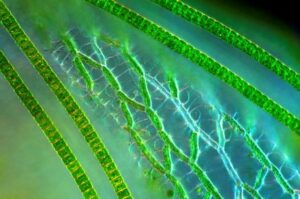 Microalgae are often referred to as « superfoods » due to their exceptional nutritional profile. First step in the aquatic food chain, their strength lies in their capacity to naturally generate and concentrate a significant number of active compounds, including carbohydrates, lipids, vitamins, trace minerals (such as copper, iron, and zinc), mineral salts, carotenoids, and additional antioxidants. More importantly, microalgae are a rich source of protein, with some species containing up to 70% protein by weight. This high protein content makes microalgae a particularly valuable source of nutrition for vegetarians and vegans who may struggle to meet their protein requirements through a plant-based diet. Furthermore, microalgae are an excellent source of omega-3 fatty acids, which are essential for maintaining heart health, reducing oxidative stress, and improving brain function. These fatty acids are originally synthesized by microalgae and typically found in fish oil via the food chain. In addition, microalgae offer an incredible source of bioactive molecules, providing high-value nutritional ingredients with powerful benefits for health and well-being. For instance, Fucoxanthin is a molecule found naturally in some algae and microalgae, such as Phaeodactylum tricornutum. This pigment from the carotenoid family is a powerful antioxidant which protects the body’s cells from free radicals and therefore also from the effects of aging. Microalgae are a powerhouse of essential nutrients, making them a valuable component of a healthy, balanced diet and offer a more sustainable, plant-based alternative.
Microalgae are often referred to as « superfoods » due to their exceptional nutritional profile. First step in the aquatic food chain, their strength lies in their capacity to naturally generate and concentrate a significant number of active compounds, including carbohydrates, lipids, vitamins, trace minerals (such as copper, iron, and zinc), mineral salts, carotenoids, and additional antioxidants. More importantly, microalgae are a rich source of protein, with some species containing up to 70% protein by weight. This high protein content makes microalgae a particularly valuable source of nutrition for vegetarians and vegans who may struggle to meet their protein requirements through a plant-based diet. Furthermore, microalgae are an excellent source of omega-3 fatty acids, which are essential for maintaining heart health, reducing oxidative stress, and improving brain function. These fatty acids are originally synthesized by microalgae and typically found in fish oil via the food chain. In addition, microalgae offer an incredible source of bioactive molecules, providing high-value nutritional ingredients with powerful benefits for health and well-being. For instance, Fucoxanthin is a molecule found naturally in some algae and microalgae, such as Phaeodactylum tricornutum. This pigment from the carotenoid family is a powerful antioxidant which protects the body’s cells from free radicals and therefore also from the effects of aging. Microalgae are a powerhouse of essential nutrients, making them a valuable component of a healthy, balanced diet and offer a more sustainable, plant-based alternative.
Thanks to their benefits, microalgae can diversify the sector of food supplements in many segments such as cognition, sports nutrition, weight management, joint health, digestive comfort and overall immunity, providing safe products with nutritional and health benefits for the end user.
Microalgae also show great promise in the field of animal nutrition. The need for protein sources for livestock, especially for aquaculture, is a major environmental concern. The traditional sources of protein for animal feed are often associated with resource-intensive production processes that can result in deforestation, habitat loss, and overfishing. Microalgae represent a promising sustainable solution to replace a portion of the current livestock feed, which predominantly comprises animal meal, along with vegetable meal.
Beyond Nutrition: The Many Benefits of Microalgae
The unique properties of microalgae make them a versatile and sustainable source of raw materials for a range of applications in various industries. One of the most significant and fastest-growing sectors is the cosmetics industry, where microalgae-derived ingredients are increasingly used in skin and hair care products. Microalgae, due to the specific active compounds they contain, make it possible to open new territories of innovation and demonstrate their remarkable potential for various activities: anti-aging, anti-inflammatory, antioxidant, reshaping, firming, moisturizing, skin protection properties and so on. While it is still an evolving area that requires further research, microalgae also exhibit potential across various sectors, including the pharmaceutical industry, the wastewater treatment sector, the field of biofertilizers, and the biomaterials industry. Overall, the diverse applications of microalgae highlight their potential to contribute to a more sustainable and healthier future.
The SCALE Project’s Role in Unlocking the Full Potential of Microalgae
 Although microalgae offer numerous benefits, their cultivation is a relatively new field, and further research and development are needed to fully harness their potential. Currently, there are only a handful of species being produced on a large scale for various industries, and there is no industrial production site that efficiently utilizes the exceptional biodiversity of microalgae that are readily available to transform them into natural ingredients. However, the SCALE project aims to address this gap by building and operating a the first-fully integrated biorefinery that utilizes the untapped diversity of microalgae to produce high-value ingredients for the food, food supplements, feed, and cosmetics sectors. This initiative aims to establish economically-sound and environmentally-friendly processes to promote the use of microalgae in various industries. To achieve this goal, the SCALE project gathers 11 key EU and international partners in an integrated value chain from microalgae production to high value ingredients extraction of bioactives compounds and end-use applications in food, food supplements, feed, and cosmetic domains.
Although microalgae offer numerous benefits, their cultivation is a relatively new field, and further research and development are needed to fully harness their potential. Currently, there are only a handful of species being produced on a large scale for various industries, and there is no industrial production site that efficiently utilizes the exceptional biodiversity of microalgae that are readily available to transform them into natural ingredients. However, the SCALE project aims to address this gap by building and operating a the first-fully integrated biorefinery that utilizes the untapped diversity of microalgae to produce high-value ingredients for the food, food supplements, feed, and cosmetics sectors. This initiative aims to establish economically-sound and environmentally-friendly processes to promote the use of microalgae in various industries. To achieve this goal, the SCALE project gathers 11 key EU and international partners in an integrated value chain from microalgae production to high value ingredients extraction of bioactives compounds and end-use applications in food, food supplements, feed, and cosmetic domains.
Would you be interested in exploring additional information on microalgae?
Here are some articles for you:
Sources:

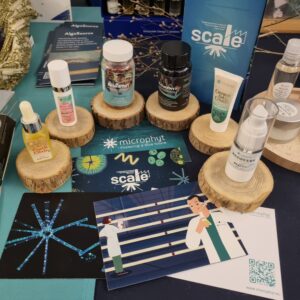
 However, despite their immense potential, only a fraction of microalgae species is currently produced globally. Enter the cutting-edge CAMARGUE photobioreactor technology, developed and patented by Microphyt. This technology propels the SCALE project toward large-scale production of a diverse range of microalgae species, opening up new possibilities for applications in food, food supplements, feed, and cosmetics.
However, despite their immense potential, only a fraction of microalgae species is currently produced globally. Enter the cutting-edge CAMARGUE photobioreactor technology, developed and patented by Microphyt. This technology propels the SCALE project toward large-scale production of a diverse range of microalgae species, opening up new possibilities for applications in food, food supplements, feed, and cosmetics.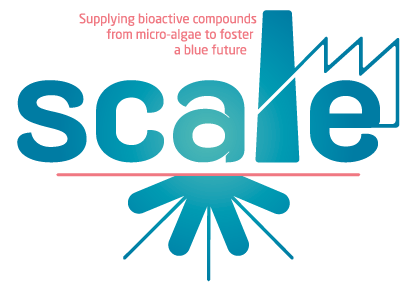
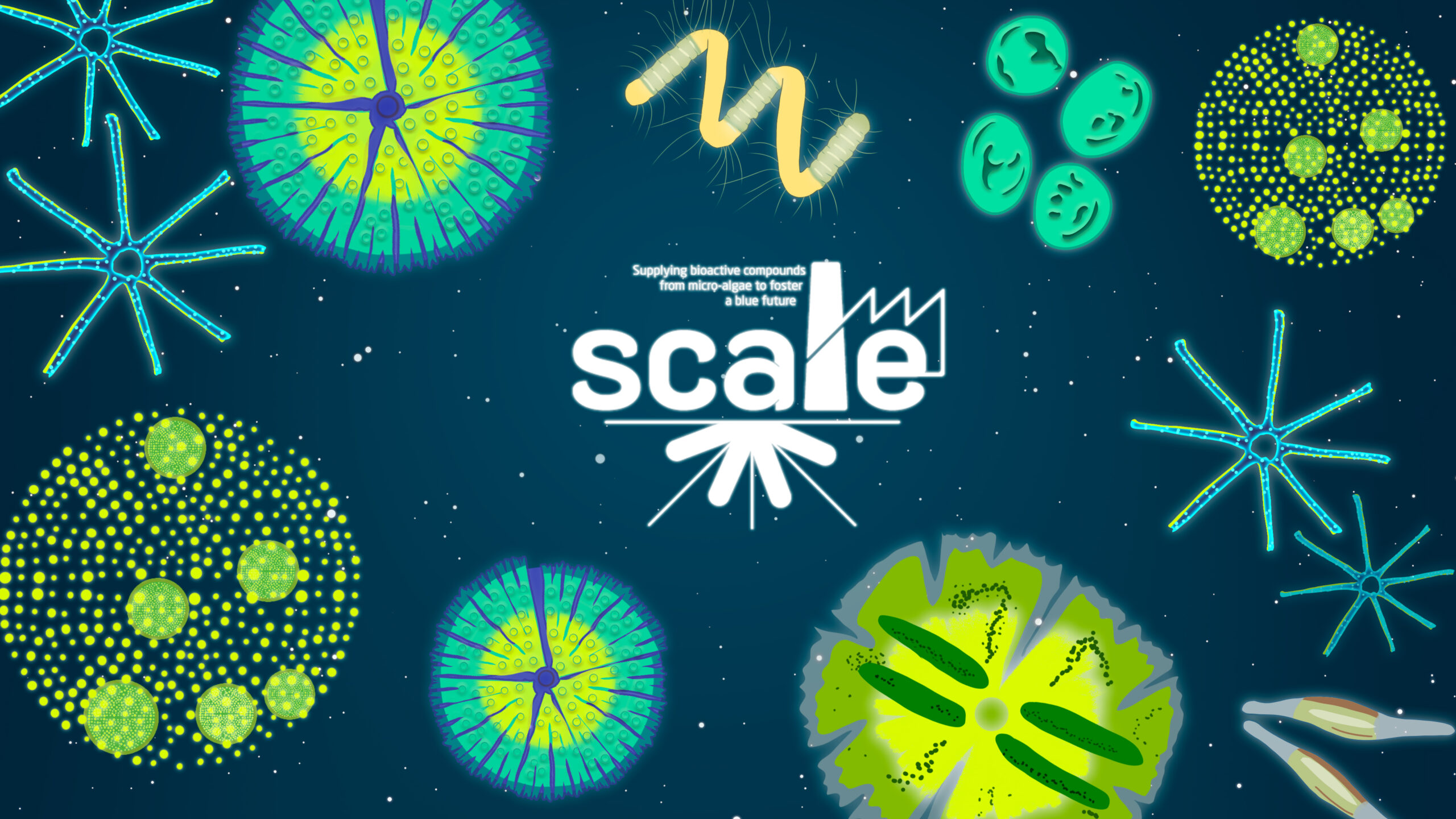
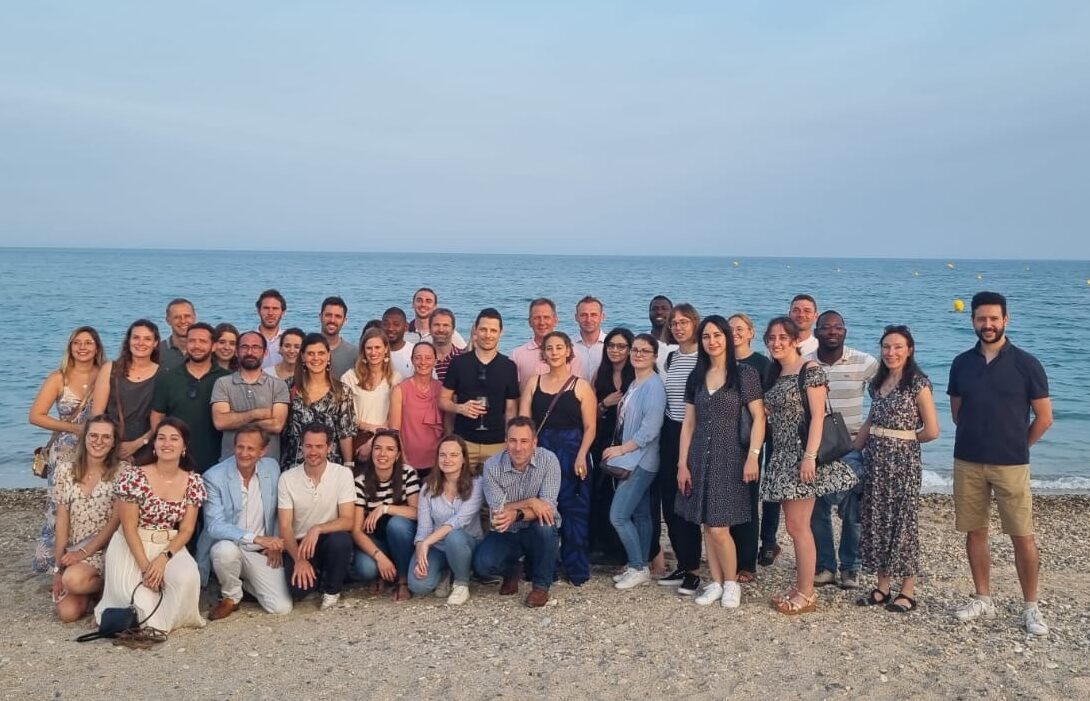
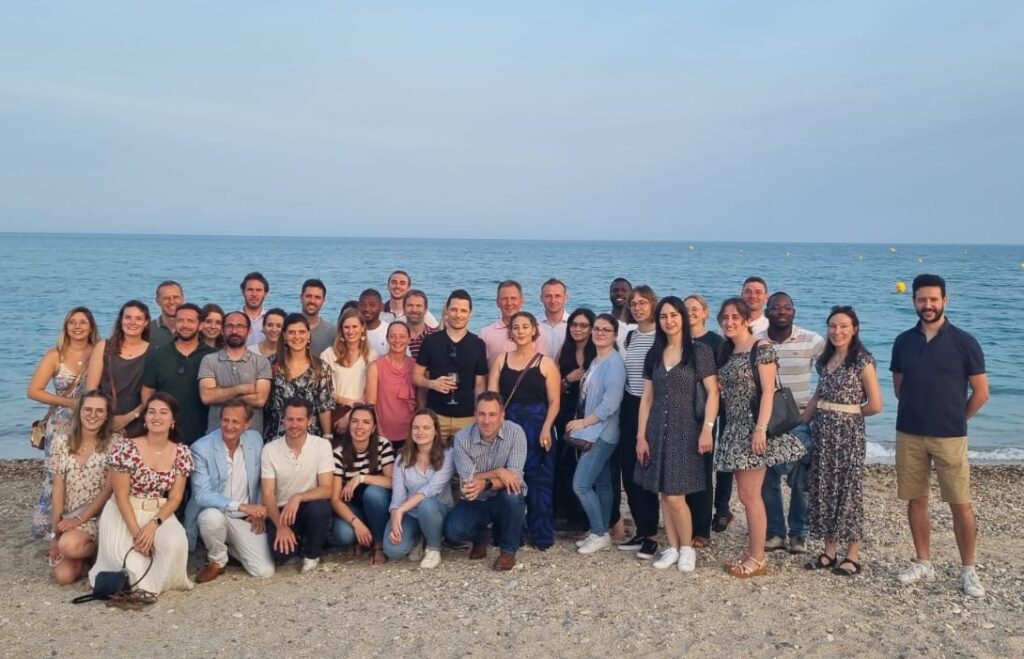
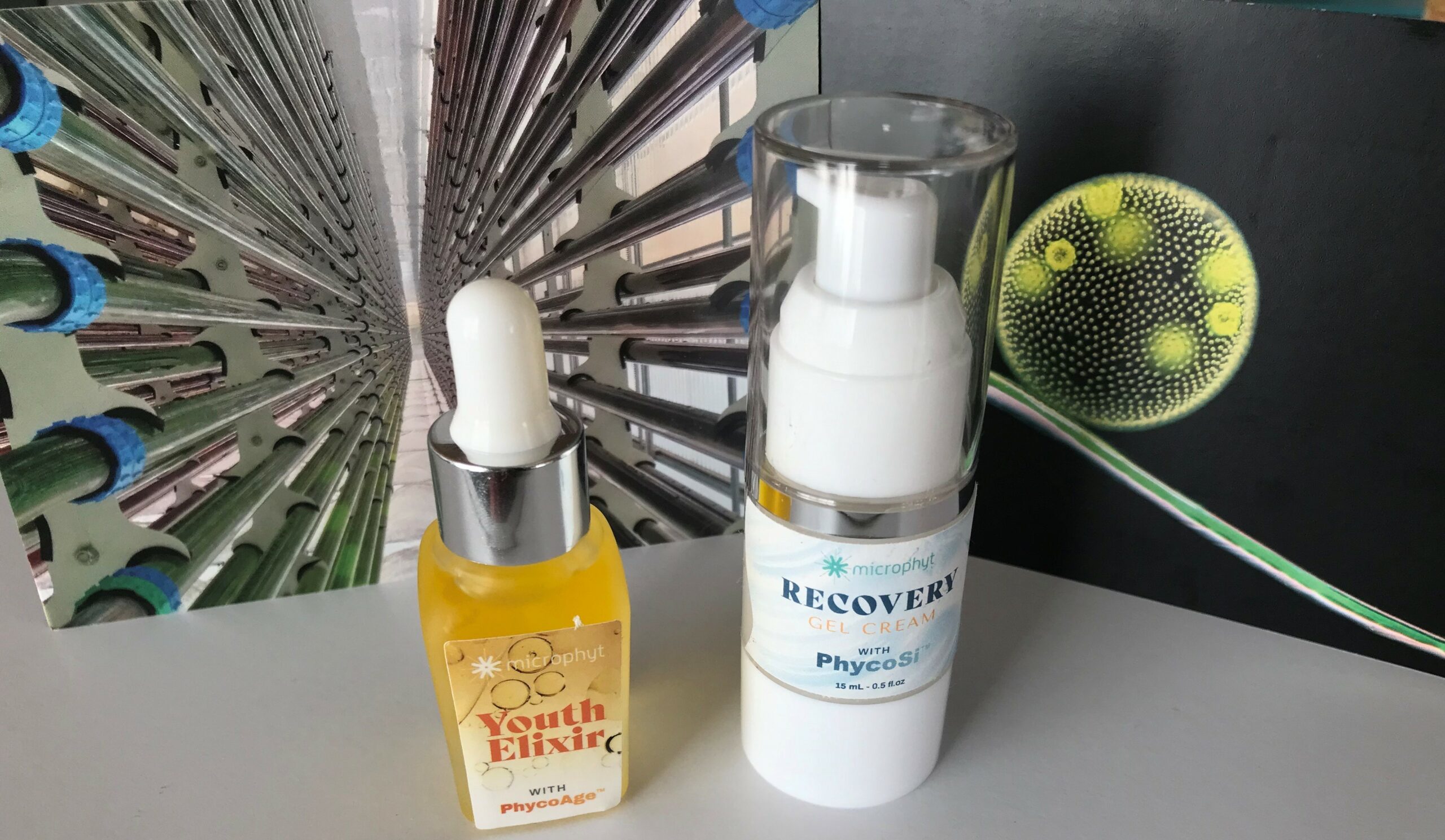
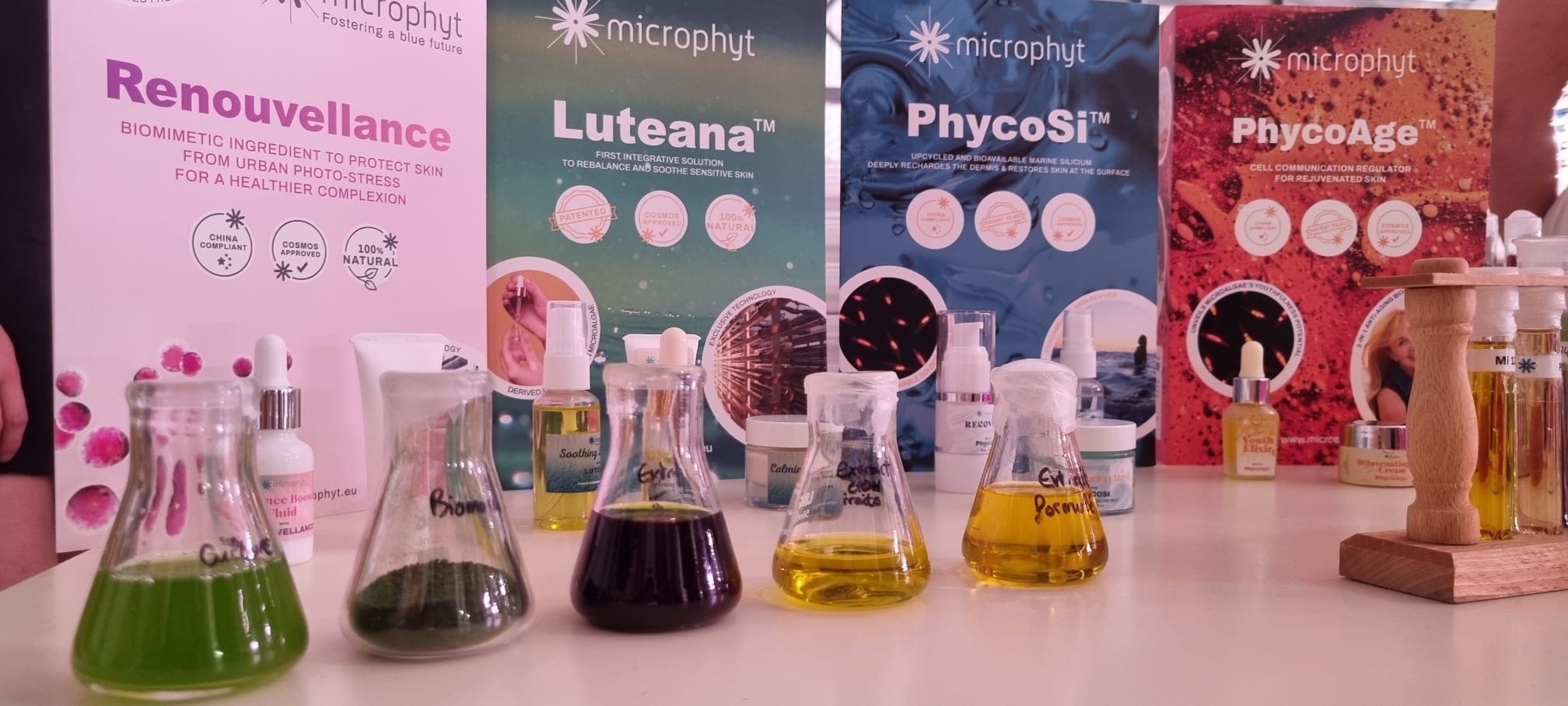
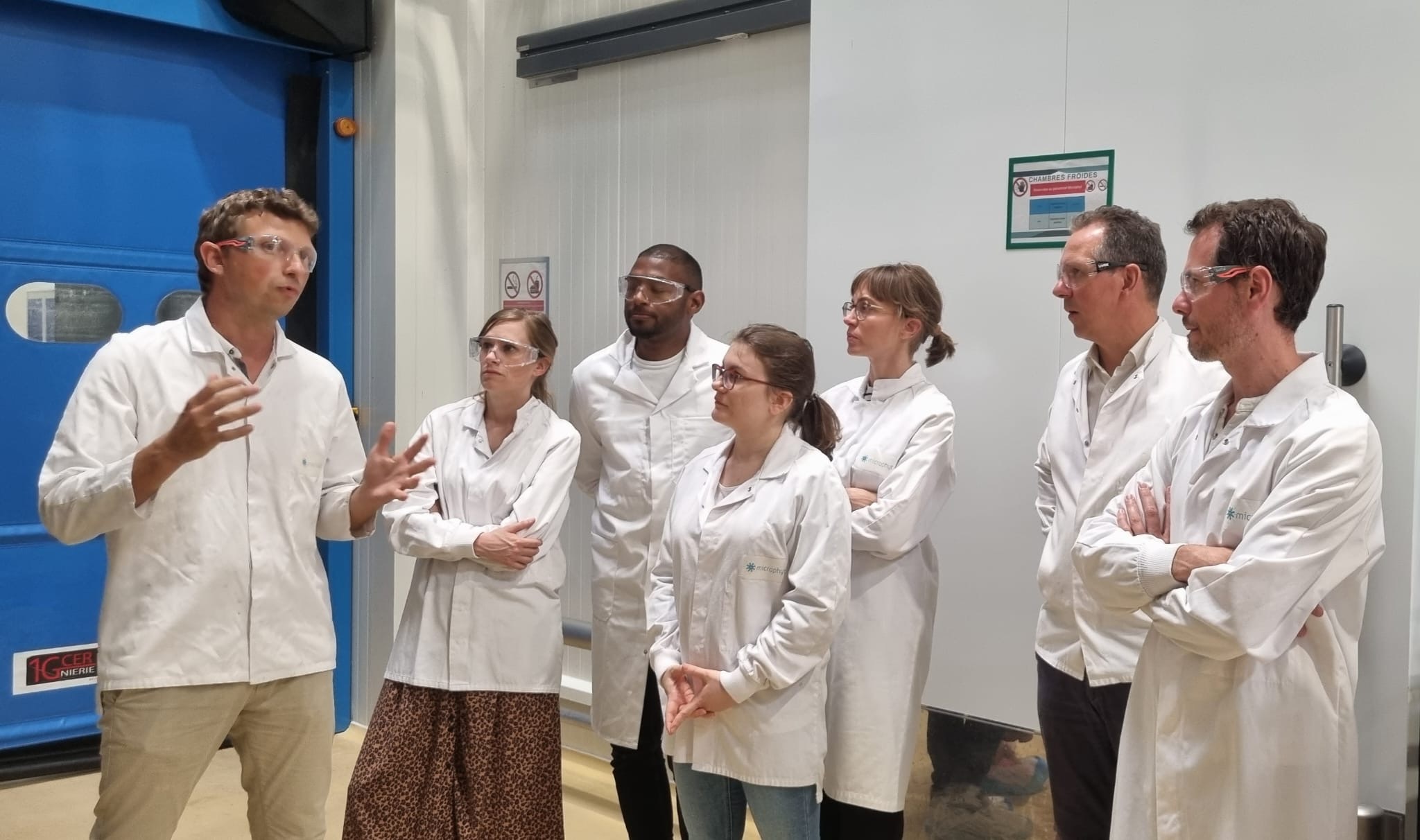


 Microalgae are often referred to as « superfoods » due to their exceptional nutritional profile. First step in the aquatic food chain, their strength lies in their capacity to naturally generate and concentrate a significant number of active compounds, including carbohydrates, lipids, vitamins, trace minerals (such as copper, iron, and zinc), mineral salts, carotenoids, and additional antioxidants. More importantly, microalgae are a rich source of protein, with some species containing up to 70% protein by weight. This high protein content makes microalgae a particularly valuable source of nutrition for vegetarians and vegans who may struggle to meet their protein requirements through a plant-based diet. Furthermore, microalgae are an excellent source of omega-3 fatty acids, which are essential for maintaining heart health, reducing oxidative stress, and improving brain function. These fatty acids are originally synthesized by microalgae and typically found in fish oil via the food chain. In addition, microalgae offer an incredible source of bioactive molecules, providing high-value nutritional ingredients with powerful benefits for health and well-being. For instance, Fucoxanthin is a molecule found naturally in some algae and microalgae, such as Phaeodactylum tricornutum. This pigment from the carotenoid family is a powerful antioxidant which protects the body’s cells from free radicals and therefore also from the effects of aging. Microalgae are a powerhouse of essential nutrients, making them a valuable component of a healthy, balanced diet and offer a more sustainable, plant-based alternative.
Microalgae are often referred to as « superfoods » due to their exceptional nutritional profile. First step in the aquatic food chain, their strength lies in their capacity to naturally generate and concentrate a significant number of active compounds, including carbohydrates, lipids, vitamins, trace minerals (such as copper, iron, and zinc), mineral salts, carotenoids, and additional antioxidants. More importantly, microalgae are a rich source of protein, with some species containing up to 70% protein by weight. This high protein content makes microalgae a particularly valuable source of nutrition for vegetarians and vegans who may struggle to meet their protein requirements through a plant-based diet. Furthermore, microalgae are an excellent source of omega-3 fatty acids, which are essential for maintaining heart health, reducing oxidative stress, and improving brain function. These fatty acids are originally synthesized by microalgae and typically found in fish oil via the food chain. In addition, microalgae offer an incredible source of bioactive molecules, providing high-value nutritional ingredients with powerful benefits for health and well-being. For instance, Fucoxanthin is a molecule found naturally in some algae and microalgae, such as Phaeodactylum tricornutum. This pigment from the carotenoid family is a powerful antioxidant which protects the body’s cells from free radicals and therefore also from the effects of aging. Microalgae are a powerhouse of essential nutrients, making them a valuable component of a healthy, balanced diet and offer a more sustainable, plant-based alternative. Although microalgae offer numerous benefits, their cultivation is a relatively new field, and further research and development are needed to fully harness their potential. Currently, there are only a handful of species being produced on a large scale for various industries, and there is no industrial production site that efficiently utilizes the exceptional biodiversity of microalgae that are readily available to transform them into natural ingredients. However, the SCALE project aims to address this gap by building and operating a the first-fully integrated biorefinery that utilizes the untapped diversity of microalgae to produce high-value ingredients for the food, food supplements, feed, and cosmetics sectors. This initiative aims to establish economically-sound and environmentally-friendly processes to promote the use of microalgae in various industries. To achieve this goal, the SCALE project gathers 11 key EU and international partners in an integrated value chain from microalgae production to high value ingredients extraction of bioactives compounds and end-use applications in food, food supplements, feed, and cosmetic domains.
Although microalgae offer numerous benefits, their cultivation is a relatively new field, and further research and development are needed to fully harness their potential. Currently, there are only a handful of species being produced on a large scale for various industries, and there is no industrial production site that efficiently utilizes the exceptional biodiversity of microalgae that are readily available to transform them into natural ingredients. However, the SCALE project aims to address this gap by building and operating a the first-fully integrated biorefinery that utilizes the untapped diversity of microalgae to produce high-value ingredients for the food, food supplements, feed, and cosmetics sectors. This initiative aims to establish economically-sound and environmentally-friendly processes to promote the use of microalgae in various industries. To achieve this goal, the SCALE project gathers 11 key EU and international partners in an integrated value chain from microalgae production to high value ingredients extraction of bioactives compounds and end-use applications in food, food supplements, feed, and cosmetic domains.